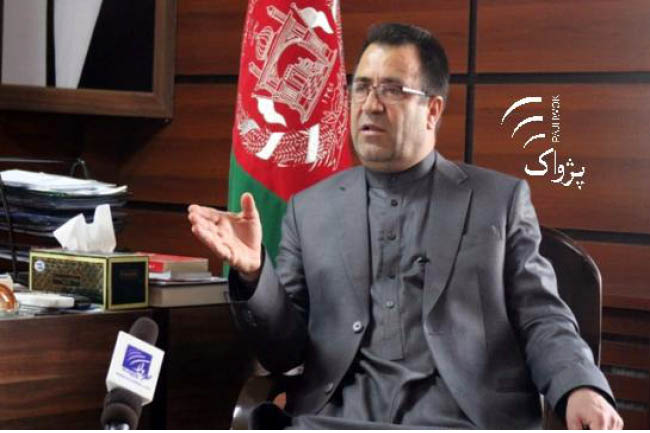KABUL - Minister of Border and Tribal Affairs Mohammad Gulab Mangal has linked increased insecurity in northern Baghlan province to the breach of an agreement signed with local tribal elders.
On the other hand, Mangal said, the issue of Pakistani identity cards distributed to residents of border areas had been shared with the National Security Council (NSC).
In an exclusive interview with Pajhwok Afghan News, Mangal spoke on insecurity in Baghlan and other important issues.
Dand-i-Ghori agreement
On September 3, 2015, a five-member Presidential Palace delegation, led by Mangal, travelled to Baghlan to assess the security situation. After spending 10 days there, the delegation signed an agreement with Dand-i-Ghori elders.
Under the deal, elders promised residents would stand by security attacks in case of attacks in the area. Security forces were required not to arrest anyone without permission from tribal elders. Facilitating displaced families’ return to their homes was also part of the pact.
However, a number of provincial council members and civil society groups claimed the militants had been given undue privileges under the agreement. But the agreement was violated a few days after it was signed.
Mangal said: “I still support the deal that was not signed with Taliban militants; it was reached with local tribal elders. But those whose personal interests are at stake say the insurgents have been given privileges.”
Without naming anyone, he alleged the pact had been violated by the elements whose financial interests were under threat from the implementation of the agreement that did not provide concessions for the militants.
Article 9 of the agreement says: “If security and intelligence organs find documentary evidence against a suspect, he/she would be treated in accordance with the law of the land.”
If allowed by President Ashraf Ghani, Mangal is ready to sign similar pacts in other parts of the country for the improvement of security. People were very happy during the first three days, he said, adding power pylons would not have damaged if the deal had not been violated.
A security operation is underway in Dand-i-Ghori and Dand-i-Shahabuddin areas for the past few days. According to reports, a large number of people have suffered casualties in the ongoing offensive.
Peace & tribal elders
A number of Afghans underline the need for giving tribal elders a proactive role in the government-led reconciliation process -- an issue that has been paid no attention.
Mangal also supported tribal elders’ involvement in the peace process. The elders should be made a bridge between the fighters and the government, as they lived among the local people. “Those tribal elders who feel insecure or have bad track records could do nothing.”
“First and foremost, we must have a strong will to enforce peace -- a process that stems from the people, not from the rulers” the minister remarked. Tribal elders were aware of people’s problems and thus they could play a good role in the peace process, he believed.
“Some of the rebels are not ideological opponents of the government, but they are obsessive opponents, because their demands are rejected and they are sidelined. As a result, they are averse to the government,” Mangal explained.
“Whenever I visit rural areas and villages, I tell tribal elders we should focus on local support for the peace process. Tribal elders’ involvement can ensure real and lasting peace,” insisted Mangal, who has also served as Helmand governor.
He went on to ask the government to pay greater attention to the protection of tribal elders, who had lately been terrorised -- something that could create widen the distance between the government and the people.
Pakistani ID cards
Pajhwok’s findings show Pakistani border forces entered 15 kilometers inside Afghanistan in the Angor Ada area of southern Paktika province. They have been asking local residents to get Pakistani ID cards.
Similarly, Pakistani security officials in the Torkham border town also offer identity cards to residents of eastern Nangarhar province. The ID cards are issued for six months if a Pakistani national stands guarantee for the recipient.
Mangal said he was aware of such ID cards issued to Afghans and occupation of some areas by Pakistani forces. But he insisted only a limited number of people had received the cards. The issue has been shared with the president and the National Security Council (NSC).
Mangal was pretty convinced that true Afghans would never accept Pakistani ID cards, because they did not want to lose their own identity. However, he thought some people might have received the cards under compulsion.
“Unfortunately, we don’t have cooperative neighbours. Those meddling in our internal affairs are harming themselves,” the minister said, when asked which border offered cause for concern. (Pajhwok)
Home » Afghanistan » Baghlan Violence Fuelled by Breach of Agreement with Elders: Mangal
Baghlan Violence Fuelled by Breach of Agreement with Elders: Mangal

